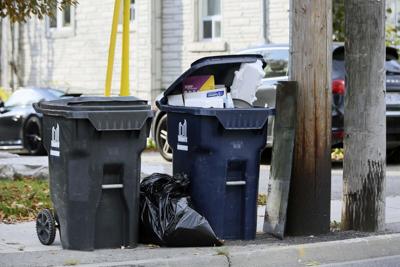The Ontario government has quietly overhauled its plan for a new provincial curbside recycling regime, tearing up key parts of a controversial regulation that had united environmental groups and some industry players in opposition.
The amended regulation, approved by Premier Doug FordŌĆÖs cabinet last week and , eliminates several of the most contentious features of the original plan, a once-in-a-generation revamp of household recycling in the province.
But while the companies that produce household recyclables in Ontario seem generally pleased with the changes, other stakeholders indicated Tuesday they are less than impressed, both with the final outcome and the process that led to it.
ŌĆ£We really wish there was some public consultation on this,ŌĆØ said Mike Chopowick, the CEO of the Ontario Waste Management Association.
The amendments posted Tuesday came after weeks of sometimes heated negotiations between the government and what are known as producer responsibility organizations (PROs), which represent the interests of companies that produce and sell household plastics, metals, glass and printed paper in Ontario.
The PROs were allowed to see draft copies of the new regulation and provide feedback before the rules were finalized, according to a source familiar with the negotiations. Other stakeholders, including ChopowickŌĆÖs group, environmental NGOs and municipalities, however, were largely kept in the dark until Tuesday, when the new, finalized regulation went online.
ŌĆ£WeŌĆÖre obviously spending a lot of time digesting this and trying to understand the full impact,ŌĆØ Chopowick said. ŌĆ£I think thatŌĆÖs part of our concern here. These arenŌĆÖt just technical changes ŌĆ” We wish they were posted on ŌĆ” the environmental registry like most regulatory amendments are. So thatŌĆÖs unfortunate.ŌĆØ
Under the current system, more than 240 Ontario municipalities run their own separate blue box programs, with the costs split between cities and the companies that produce and sell household recyclables. Under the new system, which is supposed to come into force in ║ŻĮŪ╔ńŪ°╣┘═°next summer before spreading across the entire province, the companies themselves, including giants like McDonaldŌĆÖs, Unilever and Loblaws, will be responsible not just for the entire cost of the program but for running it, too.
That idea, which is known as extended or full producer responsibility, isnŌĆÖt new, nor is it unique to Ontario. But the plan the Ford government came up with to implement it was.
Critics called the original Ford plan, first published in June 2021, ŌĆ£obtuse,ŌĆØ ŌĆ£confusingŌĆØ and ŌĆ£honestly indecipherable.ŌĆØ Some argued that it was neither tough enough to produce better recycling outcomes nor flexible enough to allow market forces to thrive.
The changes unveiled Tuesday go some way toward addressing those concerns, according to Allen Langdon, the CEO of Circular Materials, a PRO that represents many of OntarioŌĆÖs largest companies. ŌĆ£I think there are obviously some challenges with the old regulatory framework,ŌĆØ Langdon said. ŌĆ£And we think this is an improvement for sure.ŌĆØ
The new regulation eliminates the most uniquely Ontario aspects of the program, including a plan to divide the province up among competing PROs using a complicated allocation table governed by a byzantine rules-making process.
ŌĆ£The competitive model and the allocation table were clearly unworkable and itŌĆÖs good that the province appears to have recognized this,ŌĆØ said Duncan Bury, an Ontario consultant who has spent more than 25 years working on recycling systems.
More controversially, the new rules also create a carve-out for a single industry: newspapers. Under the new plan, the newspaper sector, unlike any other business in Ontario, will not be responsible for paying what it costs to collect and recycle its products.
ŌĆ£Obviously from our perspective, our producers have always believed that everyone should pay their fair share,ŌĆØ Langdon said. ŌĆ£But you know, those decisions donŌĆÖt get made by me.ŌĆØ
Paul Deegan, the executive director of News Media Canada, a lobby group that includes the ║ŻĮŪ╔ńŪ°╣┘═°Star, applauded the newspaper exception, however.
ŌĆ£The unintended consequence of (extended producer responsibility) on newspapers is to reduce the number of pages in a newspaper or for the paper to simply close or go online only,ŌĆØ Deegan wrote in an email. ŌĆ£This has a detrimental effect on small business advertisers and readers, especially ethnic communities and seniors, who rely on printed newspapers for trusted news and information.ŌĆØ
The new regulation gives PROs until July 1, 2022 to submit a plan to the province outlining in detail how a new, single collection system will work. TheyŌĆÖll then have less than a year to implement that system in some parts of the province.
Any delay in the transition could be costly. It would force some municipalities to sign expensive contract extensions with existing suppliers or work out new deals in a tight market already constrained by supply chain backlogs.
ŌĆ£ItŌĆÖs gonna be tight. ItŌĆÖs gonna be really tight,ŌĆØ Langdon said. ŌĆ£I wonŌĆÖt lie, itŌĆÖd be great if we had six more months.ŌĆØ
The province did not reply to a request for comment before the StarŌĆÖs deadline Tuesday.



























To join the conversation set a first and last name in your user profile.
Sign in or register for free to join the Conversation